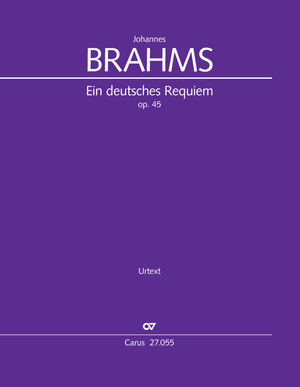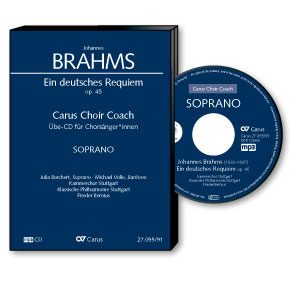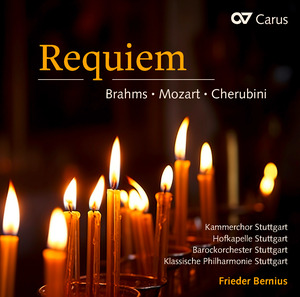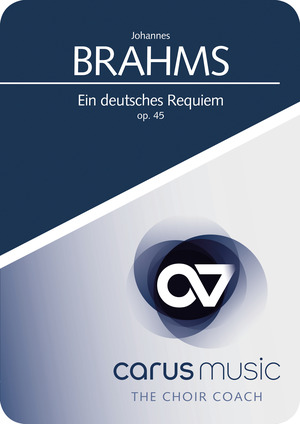
Johannes Brahms Un Requiem allemand
Paroles d'après les Ecritures Saintes op. 45
- Effectif:
- Soli SB, Coro SATB, Pic, 2 Fl, 2 Ob, 2 Clt, 2 Fg, 4 Cor, 2 Tr, 3 Trb, Tb, 3 Timp, Arpa, 2 Vl, Va, Vc, Cb, [Org, Cfg]
- Chercher les œuvres avec un effectif similaire
- Langue:
- Allemand
- Durée:
- 67 min
- Niveau de difficulté:
- 1 2 3 4 5
- Source:
- nach Worten der Heiligen Schrift
Le Requiem allemand de Brahms fait incontestablement partie des œuvres clés de l'histoire de l'oratorio. Représentant la communauté, le chœur intervient quasiment en permanence. Brahms associe de façon magistrale les techniques de composition historiques à des harmonies alors nouvelles, qui placent aujourd'hui encore les choristes face à des défis. Pour que l'œuvre ait la sonorité monumentale voulue et la profondeur d'expression souhaitée, les parties doivent être parfaitement sues – pas facile avec les nombreux changements de tonalité, les escapades vers des harmonies éloignées et quantité de pièges en ce qui concerne l'intonation.
Il suffit de s'exercer. Partout. A tout moment.
Que ce soit à la maison sur votre tablette ou votre PC ou en déplacement sur votre smartphone : avec carus music, the Choir Coach, vous avez toujours vos œuvres chorales avec vous pour vous entraîner ! Avec l'application chorale de carus music, vous pouvez écouter votre partition ainsi qu'un enregistrement de première qualité sur n'importe quel appareil et vous entraîner facilement à votre propre partie de chœur avec un coach. Avec carus music, la préparation de vos concerts est facile, efficace et amusante à maîtriser !
Interprètes: Julia Borchert (soprano), Michael Volle (basso) – Kammerchor Stuttgart, Klassische Philharmonie Stuttgart – Frieder Bernius
 Ecouter
(7)
Ecouter
(7)
- Selig, sind, die da Leid tragen
- Denn alles Fleisch es ist wie Gras
- Herr, lehre mich
- Wie lieblich sind deine Wohnungen
- Ihr habt nur Traurigkeit
- Denn wir haben hier keine bleibende Statt
- Selig sind die Toten
 S`exercer
S`exercer
-
-
Aides à l'apprentissage voix soprano
- Selig, sind, die da Leid tragen (Choir Coach)
- Selig, sind, die da Leid tragen (Choir Coach, Slow mode)
- Denn alles Fleisch es ist wie Gras (Choir Coach)
- Denn alles Fleisch es ist wie Gras (Choir Coach, Slow mode)
- Herr, lehre mich (Choir Coach)
- Herr, lehre mich (Choir Coach, Slow mode)
- Wie lieblich sind deine Wohnungen (Choir Coach)
- Wie lieblich sind deine Wohnungen (Choir Coach, Slow mode)
- Ihr habt nur Traurigkeit (Choir Coach)
- Ihr habt nur Traurigkeit (Choir Coach, Slow mode)
- Denn wir haben hier keine bleibende Statt (Choir Coach)
- Denn wir haben hier keine bleibende Statt (Choir Coach, Slow mode)
- Selig sind die Toten (Choir Coach)
- Selig sind die Toten (Choir Coach, Slow mode)
-
Aides à l'apprentissage voix alto
- Selig, sind, die da Leid tragen (Choir Coach)
- Selig, sind, die da Leid tragen (Choir Coach, Slow mode)
- Denn alles Fleisch es ist wie Gras (Choir Coach)
- Denn alles Fleisch es ist wie Gras (Choir Coach, Slow mode)
- Herr, lehre mich (Choir Coach)
- Herr, lehre mich (Choir Coach, Slow mode)
- Wie lieblich sind deine Wohnungen (Choir Coach)
- Wie lieblich sind deine Wohnungen (Choir Coach, Slow mode)
- Ihr habt nur Traurigkeit (Choir Coach)
- Ihr habt nur Traurigkeit (Choir Coach, Slow mode)
- Denn wir haben hier keine bleibende Statt (Choir Coach)
- Denn wir haben hier keine bleibende Statt (Choir Coach, Slow mode)
- Selig sind die Toten (Choir Coach)
- Selig sind die Toten (Choir Coach, Slow mode)
-
Aides à l'apprentissage voix tenore
- Selig, sind, die da Leid tragen (Choir Coach)
- Selig, sind, die da Leid tragen (Choir Coach, Slow mode)
- Denn alles Fleisch es ist wie Gras (Choir Coach)
- Denn alles Fleisch es ist wie Gras (Choir Coach, Slow mode)
- Herr, lehre mich (Choir Coach)
- Herr, lehre mich (Choir Coach, Slow mode)
- Wie lieblich sind deine Wohnungen (Choir Coach)
- Wie lieblich sind deine Wohnungen (Choir Coach, Slow mode)
- Ihr habt nur Traurigkeit (Choir Coach)
- Ihr habt nur Traurigkeit (Choir Coach, Slow mode)
- Denn wir haben hier keine bleibende Statt (Choir Coach)
- Denn wir haben hier keine bleibende Statt (Choir Coach, Slow mode)
- Selig sind die Toten (Choir Coach)
- Selig sind die Toten (Choir Coach, Slow mode)
-
Aides à l'apprentissage voix basse
- Selig, sind, die da Leid tragen (Choir Coach)
- Selig, sind, die da Leid tragen (Choir Coach, Slow mode)
- Denn alles Fleisch es ist wie Gras (Choir Coach)
- Denn alles Fleisch es ist wie Gras (Choir Coach, Slow mode)
- Herr, lehre mich (Choir Coach)
- Herr, lehre mich (Choir Coach, Slow mode)
- Wie lieblich sind deine Wohnungen (Choir Coach)
- Wie lieblich sind deine Wohnungen (Choir Coach, Slow mode)
- Ihr habt nur Traurigkeit (Choir Coach)
- Ihr habt nur Traurigkeit (Choir Coach, Slow mode)
- Denn wir haben hier keine bleibende Statt (Choir Coach)
- Denn wir haben hier keine bleibende Statt (Choir Coach, Slow mode)
- Selig sind die Toten (Choir Coach)
- Selig sind die Toten (Choir Coach, Slow mode)
 Compléments
Compléments
- Acheter des compléments au format téléchargement.
-
 texte (pas de notes) & licence d'impression, fichier html, Paroles, originalfichier html, Paroles, original (Extrait)I Selig sind die da Leid tragen (Coro)
texte (pas de notes) & licence d'impression, fichier html, Paroles, originalfichier html, Paroles, original (Extrait)I Selig sind die da Leid tragen (Coro)Selig sind, die da Leid tragen,
II Denn alles Fleisch es ist wie Gras (Coro)
denn sie sollen getröstet werden.
(Matthäus 5, 4)
Die Tränen säen, werden mit Freuden ernten.
Sie gehen hin und weinen und tragen edlen Samen,
und kommen mit Freuden und bringen ihre Gaben.
(1. Petrus 1, 24)
Denn alles Fleisch, es ist wie Gras
und alle Herrlichkeit des Menschen wie des Grases Blumen.
Das Gras ist verdorret und die Blume abgefallen.
(1. Petrus, 1, 24)So seid nun geduldig, lieben Brüder,
bis auf die Zukunft des Herrn.
Siehe, ein Ackermann wartet
auf die köstliche Frucht der Erde
und ist geduldig darüber,
bis er empfahe
den Morgenregen
und Abendregen.
So seid geduldig.
(Jakobus 5, 7)Denn alles Fleisch es ist wie Gras
und alle Herrlichkeit des Menschen wie des Grases Blumen.
Das Gras ist verdorret und die Blume abgefallen.
Aber des Herrn Wort bleibet in Ewigkeit.
(1. Petrus 1, 24+25)
Die Erlöseten des Herrn werden wiederkommen,
und gen Zion kommen...
-
 texte (pas de notes) & licence d'impression, fichier html, Texte introductif, en anglaisfichier html, Texte introductif, en anglais (Extrait)Abridged Foreword of the Edition Carus 27.055
texte (pas de notes) & licence d'impression, fichier html, Texte introductif, en anglaisfichier html, Texte introductif, en anglais (Extrait)Abridged Foreword of the Edition Carus 27.055Günter Graulich
Translation: Peter PalmerTogether with the Passions of J. S. Bach and the Requiem by W. A. Mozart, Johannes Brahms’s Ein deutsches Requiem (A German Requiem) occupies a preeminent place in the choral works of the concert repertoire. Brahms’s contemporaries laid particular emphasis on three things: the undogmatic, ultimately ecumenical choice of biblical texts, the balance and consistency in the design, and the masterly ease with which the composer succeeded in combining historical techniques and harmonies new for the period into a convincing unity.
The choice of texts is of a completely new kind. The traditional Latin requiem text is a prayer for the deceased in light of the imminent Last Judgement. Those biblical passages which Brahms selected, on the other hand, emphasize that it is not the dead but the bereaved who are in need of peace and consolation. It is true that Brahms alludes to the Last Judgement, for the line “For the trumpet shall sound” from the First Epistle to the Corinthians clearly recalls the “Tuba mirum spargens sonum“ of the liturgical text. But immediately the hope is expressed
...
-
 texte (pas de notes) & licence d'impression, fichier html, Texte introductif, en allemandfichier html, Texte introductif, en allemand (Extrait)Gekürztes Vorwort der Ausgabe Carus 27.055
texte (pas de notes) & licence d'impression, fichier html, Texte introductif, en allemandfichier html, Texte introductif, en allemand (Extrait)Gekürztes Vorwort der Ausgabe Carus 27.055Günter Graulich
Unter den Chorwerken des Konzertrepertoires nimmt Ein deutsches Requiem von Johannes Brahms mit den Passionen von Johann Sebastian Bach und dem Requiem von Wolfgang Amadeus Mozart einen führenden Platz ein. Brahms’ Zeitgenossen hoben drei Dinge besonders hervor: die undogmatische, letztlich überkonfessionelle Auswahl der Textstellen, die Ausgewogenheit und Geschlossenheit der Werkanlage und die Souveränität, mit der es der Komponist verstanden hatte, historische Satztechniken und damals neue Harmonien zu einer überzeugenden Einheit zu verbinden.
Gänzlich neuartig ist die Textwahl: Der traditionelle lateinische Requiemtext ist ein Gebet für den Verstorbenen angesichts des drohenden Jüngsten Gerichts. Die von Brahms gewählten Bibelstellen betonen hingegen, dass nicht die Toten, sondern die Hinterbliebenen der Ruhe und des Trostes bedürfen. Brahms spielt zwar auf das Jüngste Gericht an: Der Vers „Denn es wird die Posaune schallen“ aus dem ersten Korintherbrief erinnert deutlich an das „Tuba mirum spargens sonum“ des liturgischen Textes. Es wird aber sofort die Hoffnung ausgesprochen, dass
...
Sommaire
-
Compositeur
Johannes Brahms
| 1833-1897Johannes Brahms' study of musical tradition was of crucial importance to his output: he combined church modes, canonic technique, Baroque style and diction, Bach's counterpoint and Beethoven's thematic-motivic work with the harmonic and expressive achievements of Romanticism to form his own distinctive style. In this respect his choral songs and vocal quartets (e.g. the “Liebeslieder Waltzes” and “New Liebeslieder Waltzes”), often to folk song texts, in which a musical microcosm unfolds, are examplary. His “Deutsches Requiem”, available from Carus in several different versions, constitutes one of the most fascinating confessions of faith in the history of music. Plus d'information sur la personne
Les évaluations sur notre site web ne peuvent être effectuées que par des clients disposant d'un compte d'utilisateur enregistré. Il n'est pas vérifié si les produits évalués ont été effectivement achetés.
Questions fréquentes sur l'œuvre
 Il n'y a pas encore de questions et réponses concernant cette œuvre ou vous n'avez pas trouvé la réponse à votre question sur l'œuvre ? Cliquez ici et envoyez votre question spécifique à notre service clients.
Il n'y a pas encore de questions et réponses concernant cette œuvre ou vous n'avez pas trouvé la réponse à votre question sur l'œuvre ? Cliquez ici et envoyez votre question spécifique à notre service clients.







